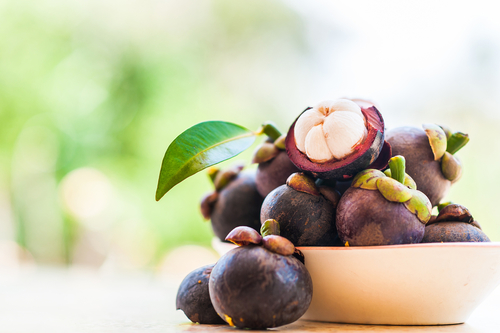Short answer
Mangosteen is an exotic fruit that has great nutritional and extensive medicinal value. Mangosteen is an extremely powerful antioxidant and natural anti-inflammatory. It is low in calories high in fiber. Mangosteen contains fructose so eating it in moderation is recommended. Mangosteen may interfere with certain medications such as chemotherapy and blooding thinning agents.
Recommended Alternative
Long answer
Mangosteen is a fascinating fruit that is popular in the regions of Indonesia, Sri Lanka, Malaysia and the Philippines. Mangosteen has a thick purple rind with a green “cap” that covers a sweet white fruit that is segmented similar to the inside of an orange. Within each white segment are some bitter seeds. The rind and underlying purple skin is bitter to taste but is edible and chock full of antioxidants and nutrients. The rind is also used in certain topical products and can be dried to make capsule supplements. You can ingest the seeds but they are also bitter to taste. Most people enjoy eating, juicing or cooking with the sweet white fruit because it is also chock full of nutrients and it tastes good.
Mangosteen has been recognized as one of the most powerful antioxidant fruits in the world. Mangosteen contains powerful phytochemicals called xanthones. Xanthones give mangosteen its potent antioxidant, antimicrobial and anti-inflammatory properties. Xanthones are also great immune boosters.
Ingesting mangosteen helps to combat toxic free radicals that enter our bodies daily. We are all surrounded by hundreds of toxins and when toxins enter our body they can enter via our skin, our digestive tract and our pulmonary tract. These impurities have an adverse impact on the body and brain by causing the formation of free radicals. These free radicals cause oxidation of the internal body that can lead to cellular damage and DNA damage. This can obviously predispose to degenerative disease, inflammatory disease, vital organ damage, metabolic syndrome, skin disorders and malignancy. Over the centuries mangosteen has been used for its impressive antioxidant and anti-inflammatory properties.
Xanthones in mangosteen have been researched extensively and found to have impressive benefits in the fight against cancer. Xanthones have been found to prevent and treat cancers in various stages of growth – slowing cancer cell division, inflammation and metastasis. Xanthones are considered preventative compounds as well as treatment compounds for numerous cancers including colon, breast, prostate and skin.
Mangosteen contains compounds that help to regulate glucose levels. These compounds inhibit enzymes that cause starches to break down into glucose. A very interesting study published in the Journal of Agricultural and Food Chemistry showed that mangosteen contains compounds that were found to be comparable to that of acarbose-a prescription drug used to treat type 2 diabetes. It should be noted that if mangosteen juice is commercially produced and extra sugars are added, then this is not recommended for a diabetic.
From a nutritional standpoint, mangosteen is low in calories and high in fiber. Fiber is excellent for the digestive system and is beneficial for maintaining stable glucose levels, helping with weight loss and maintaining good bowel elimination. Mangosteen is also a good source of prebiotics which will fuel the probiotics in your intestinal tract. This will maintain balance in the intestinal tract and help with flatulence, bloating, distention, abdominal pain or irregularity.
Mangosteen has no saturated fats or cholesterol and is a good source of potassium and vitamin C (adding to its antioxidant power). Mangosteen contains B vitamins as well as manganese and magnesium.
Topically as well as internally mangosteen is healthy for the skin and overall mangosteen is considered an anti-aging fruit.
As with any food some individuals may have an allergic response to mangosteen. Heavy prolonged ingestion of mangosteen could lead to increase glucose levels and increased lactic acid build up in the blood stream. This is much less likely with the natural fruit versus commercially produced mangosteen juice that may contain extra sugars and less than healthy additives. Mangosteen could interfere with certain chemotherapeutic agents and blood thinning medications. As with any new dietary approach checking with your health care professional is wise.
Possible short-term side effects
- possible allergic reaction
- can interfere with certain medications such as chemo and blood thinning agents
Possible long-term side effects
- frequent prolonged ingestion may elevate glucose and lactic acid in the blood

Benefits
- natural anti-inflammatory
- powerful antioxidant
- boosts the immune system
- low calorie and high in fiber
- good source of vitamin c and potassium
- good for the gastrointestinal system
- helps acne and other skin disorders
- can help with pain and mobility
- has anti-cancer properties
- natural antimicrobial
- cardiovascular friendly
- can help with weight loss and metabolic syndrome
Healthier alternatives
- stick with the natural fruit and avoid commercially peoduced juice that may have added sugars
Our Wellness Pick (what is this?)
Mangosteen Fruit Powder
- Rich in antioxidants
- Supports immune system
- Organic certified
- Non-GMO
- Gluten-free
 Approved by
Approved by 















